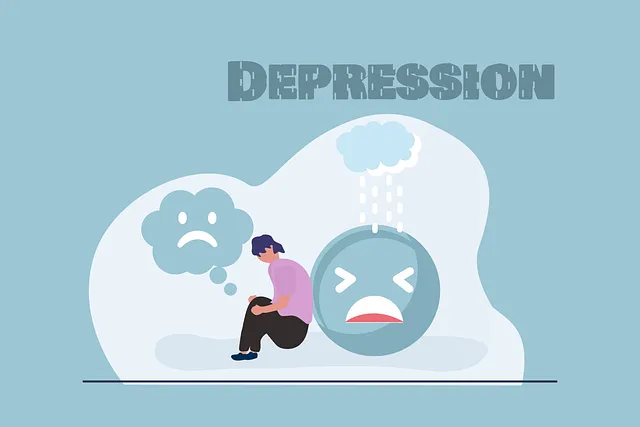Kaiser Permanente behavioral health providers in Louisville offer holistic mood disorder management through therapy, medication, and self-awareness exercises. They combat mental health stigmas with robust risk management planning, providing accessible CBT and mindfulness practices for stress regulation. Lifestyle adjustments, including nutrition, physical activity, and sleep, are emphasized for emotional balance. Strong social connections are encouraged as vital support networks for resilience, empowering individuals to navigate life's challenges and promote overall well-being.
“Discover effective mood regulation strategies inspired by the expertise of Kaiser Permanente behavioral health providers in Louisville. This comprehensive guide explores diverse techniques, from evidence-based Cognitive Behavioral Therapy (CBT) to mindfulness practices and lifestyle adjustments like nutrition, exercise, and sleep. Learn how these holistic approaches, backed by local specialists, can foster emotional balance and enhance overall well-being. Empower yourself with knowledge tailored to your mental health journey.”
- Understanding Mood Regulation: The Role of Kaiser Permanente Behavioral Health Providers Louisville
- Cognitive Behavioral Therapy: Effective Techniques for Emotional Balance
- Mindfulness Practices: Cultivating Presence and Calming the Mind
- Lifestyle Adjustments: Nutrition, Exercise, Sleep for Mood Stabilization
- Social Connections and Support: Building a Resilient Network
Understanding Mood Regulation: The Role of Kaiser Permanente Behavioral Health Providers Louisville

Understanding Mood Regulation is a multifaceted process, and Kaiser Permanente Behavioral Health Providers Louisville play a pivotal role in this domain. These professionals are trained to offer comprehensive support for individuals navigating mood disorders. They utilize evidence-based strategies tailored to each patient’s unique needs, fostering resilience and emotional well-being.
The team at Kaiser Permanente Louisville integrates various techniques such as therapy, medication management, and self-awareness exercises into their practice. They also contribute to public awareness campaigns focused on mental health development, aiming to reduce the stigma surrounding mood regulation. Moreover, through effective Risk Management Planning for Mental Health Professionals, they ensure a safe and supportive environment for both patients and practitioners, ultimately enhancing access to quality care.
Cognitive Behavioral Therapy: Effective Techniques for Emotional Balance

Cognitive Behavioral Therapy (CBT) is a powerful tool for individuals seeking to gain emotional balance and manage their moods effectively. This evidence-based approach, offered by Kaiser Permanente behavioral health providers in Louisville, focuses on identifying and changing negative thought patterns and behaviors that contribute to mood disorders. CBT teaches clients to recognize and challenge distorted thinking, replace it with more realistic and positive thoughts, and adopt corresponding actions.
Through various techniques, such as mindfulness exercises, goal setting, and problem-solving skills, CBT empowers individuals to take an active role in their mental health. By learning to navigate challenging situations with improved coping strategies, patients can enhance their overall well-being and build resilience. This therapy is particularly beneficial for those dealing with anxiety, depression, and stress-related conditions, as it promotes mental health awareness and equips individuals with valuable risk management planning tools, including empathy building strategies, to navigate life’s complexities.
Mindfulness Practices: Cultivating Presence and Calming the Mind

Mindfulness practices offer a powerful tool for mood regulation. By cultivating presence and calming the mind, individuals can enhance their ability to navigate life’s challenges with greater equanimity. Kaiser Permanente behavioral health providers in Louisville emphasize the importance of mindfulness as an accessible and effective strategy for improving mental health awareness and stress management. These practices involve focusing on the present moment without judgment, allowing individuals to gain a deeper understanding of their thoughts and emotions.
Regular mindfulness exercises, such as meditation or deep breathing techniques, can significantly boost confidence and resilience. By quieting the mind’s chatter, people can reduce reactive behaviors and make more thoughtful decisions under stress. Through dedicated practice, mindfulness becomes an integral part of daily life, fostering a sense of inner calm that resonates even in the most chaotic situations.
Lifestyle Adjustments: Nutrition, Exercise, Sleep for Mood Stabilization

Maintaining a balanced mood is achievable through lifestyle adjustments that are often simple yet powerful tools recommended by Kaiser Permanente behavioral health providers Louisville. Nutrition plays a significant role, with studies suggesting that a diet rich in fruits and vegetables can significantly improve one’s mental well-being. Incorporating regular physical activity, such as brisk walking or yoga, has been shown to reduce stress hormones and enhance mood, providing an effective strategy for many individuals. Adequate sleep is another cornerstone; it allows the brain to rest, reset, and consolidate memories, which is crucial for emotional regulation.
These lifestyle changes are not just isolated practices but interconnected elements that contribute to overall mental health. For instance, regular exercise can improve sleep quality, leading to better mood stabilization. Similarly, a nutritious diet provides the body with essential nutrients required for optimal brain function, including neurotransmitters responsible for regulating emotions. The community outreach program implementation of these strategies can foster empathy-building among individuals, offering practical tools to navigate and stabilize their moods effectively.
Social Connections and Support: Building a Resilient Network

Social connections and support networks are vital components of mood regulation strategies, especially in fostering resilience among individuals. Kaiser Permanente behavioral health providers Louisville emphasize the importance of building a strong social tapestry where one can find comfort, understanding, and encouragement. This includes family, friends, and peers who offer emotional backing and act as a safety net during challenging times. Such connections can significantly enhance an individual’s ability to cope with stress, anxiety, or depression.
By fostering meaningful relationships, individuals can reduce feelings of isolation and loneliness, which are significant risk factors for mental health deterioration. Mental Health Policy Analysis and Advocacy highlights the role of supportive communities in preventive measures against burnout, a common issue among healthcare providers, including Kaiser Permanente behavioral health providers Louisville. Effective social support systems empower individuals to navigate life’s complexities and promote overall well-being, thereby mitigating the impact of adverse events on one’s mental state.
In conclusion, mood regulation is a multifaceted process that involves various strategies recommended by Kaiser Permanente behavioral health providers Louisville. Cognitive Behavioral Therapy offers effective techniques for emotional balance, while mindfulness practices cultivate presence and calmness. Lifestyle adjustments, including proper nutrition, exercise, and sleep, play crucial roles in stabilizing moods. Moreover, building strong social connections and support networks enhances resilience. By integrating these evidence-based approaches, individuals can effectively manage their moods and improve overall well-being.






